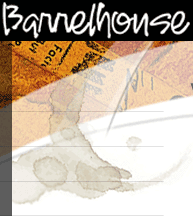|
|
 |
 |

by Richard Grayson
New York City, 1985
In the fall of 1985, I was living at my friend Judd's apartment in Park Slope while he was in Reading, Pennsylvania, directing "Pippin" and other plays at a dinner theater. I took over Judd's bedroom on the fourth floor of a duplex apartment in a President Street brownstone.
Across the hall from me was the bedroom of one of Judd's roommates, Kenny, a thirtyish African-American actor from Wisconsin. Downstairs, in what should have been the living room, was Judd's other roommate Kenny, a blond kid who’d just graduated Reed College and was trying to break into book publishing.
When my great-aunt Tillie Metz invited me to have Rosh Hashana dinner at her apartment in Rockaway, she told me I could bring along my temporary roommates, too.
"What are their names?" Aunt Tillie asked me.
"Oh, they’re both named Kenny," I said.
Aunt Tillie frowned. "Then how will I tell them apart?"
"Um, one's white and the other's black," I said.
"Whew," Aunt Tillie said. "Lucky for me."
That term I was teaching remedial writing at two City University colleges in Manhattan, Baruch College and John Jay College of Criminal Justice. At the time, they wouldn't let us part-time teachers teach more than three courses at CUNY because then technically we'd be full-time employees eligible for benefits.
I needed to teach four classes to pay my bills, so at Baruch I taught under my real Social Security number and at John Jay I taught under my Bizarro Social Security number with all the digits reversed. They never caught me.
That fall Nation of Islam leader Louis Farrakhan was speaking at a huge rally at Madison Square Garden that had engendered a lot of controversy. Mayor Koch and other politicians and religious leaders accused Farrakhan of racism and anti-Semitism. Supposedly he'd called Judaism "a gutter religion" and Hitler "a great man," although he'd qualified that by adding "wickedly great."
One of my Baruch classes got into a big discussion about Farrakhan about a week before the rally. The class was pretty diverse, about one-third African-American, one-third Hispanic (mostly Puerto Rican), one-third Asian (Chinese and Vietnamese/ethnic Chinese), along with a couple of Guyanese girls.
There were two African-American students who didn't get along all semester. If Derrick took one position on an issue -- like his preference for the serial comma in a list (to use my hilarious blackboard example: raisin bran, oatmeal, and cornflakes) -- Sharon would take the opposite position.
If Jenny (Teh-Fang was her name on the roster) said that New Jersey was beautiful, Derrick would raise his hand to agree and then Sharon would raise her hand to argue with what Derrick had just said.
Derrick and Sharon would sit on opposite sides of the room and glare at each other.
Predictably, Derrick loved Farrakhan's message of self-help and self-determination, finding the minister a worthy successor to Malcolm X. I just nodded at his comments and mentioned that I had worked with Malcolm's widow, Dr. Betty Shabazz, when I had taught remedial writing at Medgar Evers College in Brooklyn.
Sharon immediately raised her hand and said Derrick was just showing his ignorance, that Farrakhan was a total fraud and his speeches just incited hatred.
Derrick yelled back before Sharon could finish her critique of him and Farrakhan, and then other students got involved and pretty soon the classroom was kind of out of control till a Puerto Rican kid, who'd been in the army, got everyone to shut up.
"Can we get back to subject/verb agreement?" Jenny (Teh-Fang) asked. She didn't like to waste an English class on talk about Farrakhan.
But I thought it was a teachable moment. I told Derrick and Sharon they should both go to Madison Square Garden to see Farrakhan and use their critical listening, thinking and writing skills to produce a report on the rally.
I never expected that they'd go together, but they did.
Derrick read his report on our next class following the rally. He found the rally electrifying and praised Farrakhan as a fount of wisdom and righteousness.
Sharon went next, although she wanted to talk her report rather than read it. "I still think he is messing with the black man's mind," she said of Farrakhan. "He did a lot of agitating."
She looked over at Derrick and smiled. "I do admit some of his ideas make a kind of sense, like raising ourselves by our bootstraps. But mostly it's just stupid rhetoric."
Derrick smiled back at her.
After that, they started sitting next to each other. They stopped disagreeing. They'd come in together and leave together.
And once I heard from the two elevator operators in our Baruch building -- I didn't know their names, but from their job performance I thought of them as "Whiplash Willie" and "Myrtle the Turtle" -- that Derrick and Sharon were making out during elevator rides.
Both of them passed the CUNY Writing Assessment Test at the end of the semester and went on to regular freshman composition.
Judd returned from directing dinner theater in Pennsylvania and so I had to vacate his apartment. He told me he'd had "a little romance" with the actor who played the king in "Pippin." Barry soon moved to Brooklyn to be with Judd and they've been together ever since.
At the end of that semester, I went to Florida to escape winter, mooch off my parents and teach some adjunct courses at Broward Community College. I never taught at Baruch College except for that one term.
I'd like to think that the little romance between Derrick and Sharon has lasted twenty years like Judd and Barry's relationship, but somehow I doubt it.
Nevertheless, it's nice to know they at least had a few months of love.
Gainesville, 1996
Exactly ten years later, I was working as a staff attorney in social policy at the Center for Governmental Responsibility at the University of Florida law school. My salary was paid for by a grant from the state department of education because I was the legal consultant to an initiative called Schoolyear 2000. Mostly I researched legal issues in educational technology.
But I also got involved in other things the Center did. My supervisor Liz, the director of social policy and an expert in poverty law, ran the school’s Florida Bar Foundation Public Interest Law Fellowship program and I helped her.
Every February we’d dress in business attire one week and interview the law students applying for the fellowship, which gave them a $3,000 stipend to work at places like the public defender, the guardian ad litem agency, Three Rivers Legal Services, the Battered Women’s Clemency Project, or the Department of Environmental Protection.
Liz and I would pick eight to ten fellows each year, mostly on the basis of the pro bono and volunteer work they’d already done and their commitment to use their legal skills to help people who needed it.
Most of the fellows we selected were African-American women because they tended to make up the majority of the students who applied.
Deirdre was one of our fellows for the 1995-1996 academic year. A nurse, she had been in the army and was a Gulf War veteran. Deirdre did well academically and I got great reports on her from the supervising attorneys at Southern Legal Counsel.
In the fall of 1996, Minister Farrakhan was again in the news because of his planned Million Man March on Washington scheduled for mid-October.
I knew a couple of black men who had decided it was important for them to attend. My boyfriend Terrence wasn’t one of them. Terrence said of Farrakhan, “I think he’s full of shit.”
I also knew that women were not really welcome at the Million Man March. Farrakhan suggested that women stay home, that the event was for the brothers only, because they were the ones who needed to hear what he was going to say.
Nevertheless, some women, Deirdre among them, decided that they wanted to go to Washington. “I think it’s important for women to be there,” she said when she came to let me know that she would not be going into work or attending classes for a few days.
I could have said something about misogyny, sexism and homophobia but I didn’t. When I wanted to lecture, I could do it to the students I taught English at the local community college in the evenings, after I got off work at the law school. And even then, I probably wouldn’t have said anything; mostly I just let the students air their own views.
Anyway, I watched some of the March on TV. In some ways it was inspiring. But I found Farrakhan’s speech laced not so much with hatred but with examples of fuzzy thinking and bizarre talk about esoteric numerology, Masonic conspiracies and musical scales.
As a (research) faculty member at a law school, I valued logic a lot more.
A few weeks after the rally, I attended a talk Deirdre and two other African-American students who’d been in Washington gave about their experiences there. It sounded to me like a lot of positive stuff might come out of the Million Man March after all.
But it wasn’t till Liz’s annual Christmas party that I found out Deirdre’s personal positive stuff that came out of the Million March March. She introduced me to Wade, her fiancé.
Deirdre and Wade had met in a hotel bar the evening before the march. He was a Jamaican-born real estate developer in Brooklyn. When I learned out his last name, I knew it as that of a family prominent in borough politics and business. Wade was the only guy at the party in a business suit.
In the next few months, I’d hear that during his visits to Gainesville, he’d been scouting out property to buy and develop and that he’d made good connections with everyone in town who counted. A city commissioner I knew slightly was impressed that I was acquainted with Wade. “A quality fellow,” she called him.
I was surprised to get an invitation to Deirdre and Wade’s wedding that May. Deirdre was graduating from law school; after she took the bar exam, Deirdre and Wade were planning to divide their time between Gainesville and New York.
Since I hadn’t been to a wedding for years and didn’t have any idea what to get for a present, I gave Liz $25 and told her to get something from both of us. She bought this beautiful multicolored ceramic vase.
The ceremony was on a Saturday afternoon in the lush gardens in the back of a historic Victorian inn on East University Avenue. Most of the African-American elite of the town were present, along with some prominent white politicians and business leaders.
So were Deirdre’s fellow Florida Bar Foundation Public Interest Law Fellows, her favorite professors, the attorneys from Southern Legal Counsel, Liz and me.
I didn’t mist up during the ceremony, not even when Gainesville’s only black female judge, a good friend of Liz’s, pronounced Wade and Deirdre husband and wife.
But I thought it was lovely.
I was on a diet but I took a piece of wedding cake home.
That night I sat at my kitchen table and watched Terrence eat it. He was painfully thin.
He listened to me tell him once again about the wedding, about Wade and Deirdre’s fairy-tale romance.
“Romance is nice and the cake was delicious,” Terrence said. “But I still think Louis Farrakhan is full of shit.”
We broke up a week later.
Richard Grayson lives in a gated adult community in Phoenix. He is a retired college teacher and lawyer whose books of short stories include With Hitler in New York, Lincoln's Doctor's Dog, I Brake for Delmore Schwartz, The Silicon Valley Diet, I Survived Caracas Traffic and the forthcoming And To Think That He Kissed Him on Lorimer Street.

|
|
|




